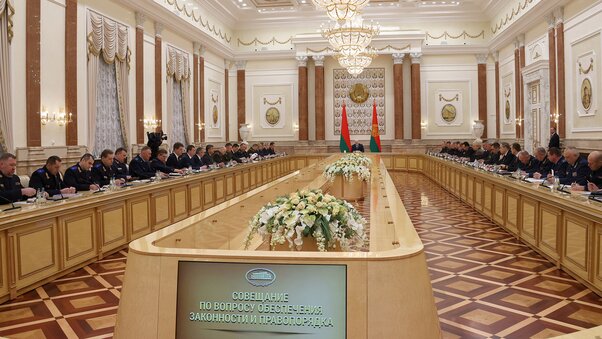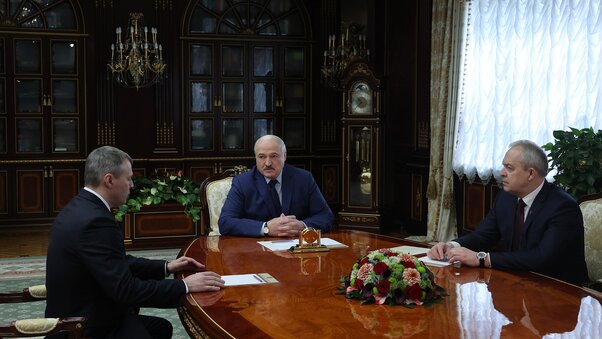Report of Justice Minister Sergei Khomenko
- 8
- 6:03
Belarusian President Aleksandr Lukashenko met with Justice Minister Sergei Khomenko to receive his report on 21 April.
Sergei Khomenko was appointed Justice Minister some six months ago. According to Aleksandr Lukashenko, the load on the civil servants in Belarus is enormous, which means that the service term can be considered as twice as long.
“We agreed that you would take a fresh look at the Justice Ministry, and as a person who may not be so close to policy making and especially the control and organization of the policy making process, will think about the ways to improve the work of the Justice Ministry,” the President said. “I would like to hear from you what the situation is, what executive discipline is in your agency and how the personnel work. Human resources management has always been and will remain the number one issue. I want to hear your point of view on the matter.”
Along with Sergei Khomenko, Aleksandr Lukashenko invited Deputy Head of Belarus President Administration Olga Chupris to hear out her report.
The head of state recalled that amendments to the Constitution of Belarus had been recently adopted, thus creating “a new framework for the state in the area of law and lawmaking”. “Of course, we should have estimated long ago how many amendments, additions and laws we need to make to develop the Constitution adopted by referendum. This work should be started immediately,” the President said. “Both of you will have to deal with it in the first place. We will all be involved in the process because policy making cannot depend on two people or two agencies only. This is out of the question. The whole country should be involved in these processes.”
Aleksandr Lukashenko asked how the Justice Ministry saw this work and when it was scheduled to begin. The President noted that the legislation should be brought in line with the updated Constitution within two years. “We have to adopt the basic laws as soon as possible,” he stressed.
Aleksandr Lukashenko said: “As far as I can understand the Justice Ministry controls the work of defense attorneys. Let’s speak plainly: I hope you will also manage processes relating to the bar association. And the notarial system. Those are complicated structures, which were created by interested people in the past.”
The head of state explained why he has to actively interfere and control the work of the defense attorneys and the notarial system: “Some people tried to profiteer from it, primarily for their own gains. And it was in your time. You remember how I had to destroy this ‘gang’ as I vulgarly put it back then. I don’t think we’ve resolved all the issues over there.”
“Defense attorneys must be under control but should act in line with the law and should be genuine defense attorneys. A defense attorney has to do their job without fearing anything but at the same time we should understand that he or she is a person of the state. And their actions should be based on norms of the law instead of some cooked-up notions of the freedom of speech and other freedoms. We are already fed up with this freedom. Thank god, we saw what freedom is being brought to us here,” he said.
The head of the state said that the country was in for big work to build parties and bring order to public associations. “People need to be given a clear message about what civil society is and what it consists of, and this should be reflected in the law. The law should define it clearly,” the Belarusian leader stressed.
Aleksandr Lukashenko wondered about the performance of the court rulings enforcement service, which had been established as an independent division a considerable time before. “How are they doing today? What do they lack?” he said.
“And another question in connection with what was mentioned during the latest government conference – the enforcement of court rulings,” Aleksandr Lukashenko pointed out. “Debts to the state budget must be collected. As a general you should understand better than anyone that it must be settled. It is a punishment pronounced by the court.”
“Court rulings must be executed. This is why it is necessary to clean it all up and demand execution by the end of the year. If they don’t execute rulings, you know what to do,” the head of state stressed.


